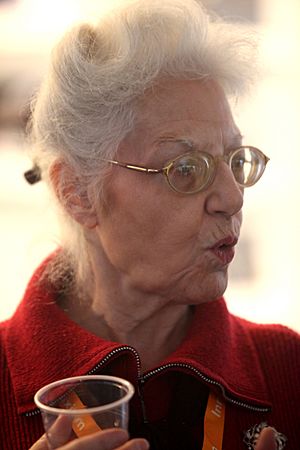Andrée Ehresmann facts for kids
Quick facts for kids
Andrée Ehresmann
|
|
|---|---|

Andrée Ehresmann in December 2010
|
|
| Born |
Andrée Bastiani
September 7, 1935 |
| Nationality | French |
| Alma mater | University of Paris |
| Spouse(s) | Charles Ehresmann |
| Scientific career | |
| Fields | Mathematics |
| Institutions | University of Picardy Jules Verne |
| Thesis | Différentiabilité dans les espaces localement convexes. Distructures (1962) |
| Doctoral advisor | Gustave Choquet |
Andrée Ehresmann (born Andrée Bastiani in 1935) is a famous French mathematician. She is known for her work in a field of math called category theory.
Contents
Becoming a Mathematician
Early Career and Studies
Andrée Ehresmann started her career as a researcher at CNRS in France. This was from 1957 to 1963. She earned her highest university degree, a Ph.D., in 1962. She studied at the University of Paris. Her main teacher was Gustave Choquet. Her Ph.D. work was about "Differentiability in locally convex spaces."
Professor at the University
In 1967, Andrée Ehresmann became a professor. She taught at the University of Picardie Jules Verne. Today, she is an emeritus professor there. This means she has retired but still holds an honored title.
What Andrée Ehresmann Studies
Exploring Math and Systems
Andrée Ehresmann has written many important papers. Her work covers different areas of mathematics:
- Analysis: This part of math deals with how things change. She studied things like how to find the best solutions to problems.
- Category Theory: She worked with her husband, Charles Ehresmann, on this. Category theory is a way to study math using "categories." These are like collections of objects and the ways they relate to each other.
- Complex Systems: She also studies how complex systems work. This includes things like how our brains remember things.
Memory Evolutive Systems
Andrée Ehresmann, along with J.-P. Vanbremeersch, created a special idea called "Memory Evolutive Systems." This is a mathematical way to understand "living" systems. These systems have many complex parts and change over time. Examples include:
- Biological systems: Like how plants and animals grow.
- Neuro-cognitive systems: How our brains think and learn.
- Social systems: How groups of people interact.
This model helps scientists understand how complex things appear and how systems organize themselves.
Leading a Math Journal
Andrée Ehresmann is also the director of a math journal. It is called Cahiers de Topologie et Géométrie Différentielle Catégoriques. This journal publishes new research in topology and category theory.

